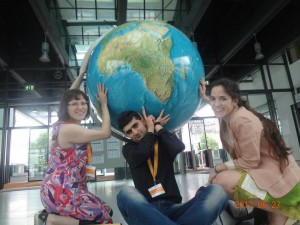Looking back on the blog
Reading Pavel’s last entry as well as the one where he discussed the value of a degree, I’ve been thinking, too, about the value of studying foreign languages. It’s not just about new grammar and vocabulary, or being able to translate from one language to another. From my view, the value of doing so has more to do with learning how to express your ideas in a different culture – through a different perspective and perhaps in a context that helps everyone broaden their views. At the Global Media Forum, I met a number of people who serve as good examples of what I mean.
Simon was one. We met randomly at a table and introduced ourselves to each other. When I told him I’m from Buenos Aires, he said he had been there and liked it a lot, and that he actually speaks Spanish. When I asked him about his professional background, he told me about an initiative called Vensenya, a name made up of two Spanish words: “vencer,” which could be translated as “conquer”, “defeat”, “break”; and “enseñar,” which means “teaching.” The word “vencer” is particularly significant to Spanish speakers, especially in Latin America, considering its historical associations with political struggle and combat. Vensenya is about breaking down dogmas in our approach to education. The concept that their creators came up with can be grasped in a snap. This is not just a question of speaking another language. It shows how understanding another culture can find its expression in language.
More often than not, in the context of international dialogue, you find that concerns are shared across borders. Education systems pose challenges in every country. What differs is the social context and the historical path of each nation.
In this entry, I have touched on all of the things that made me enjoy writing this blog so much. On the one hand, it has been a struggle on many occasions. Putting societies in context and accounting for cultural nuances is hard. But on the other hand, it has been greatly satisfying throughout.





